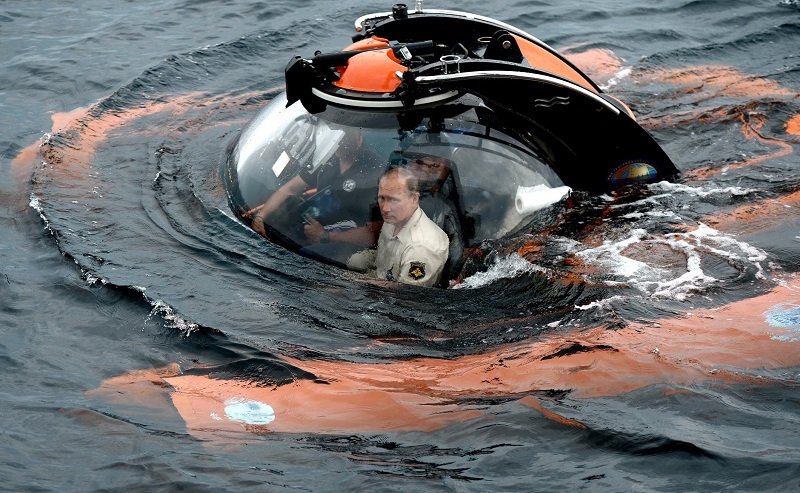
It’s tempting to view the recent confrontation between Russian and Ukrainian naval vessels in the Sea of Azov—in which Russia denied Ukrainian vessels access to the Strait of Kerch and the Ukrainian city of Mariupol—as an extension of the ongoing conflict between the two countries.
Moscow was clearly testing Ukraine’s response to its aggressive interdiction and may have been seeking to provoke an overreaction by Kyiv. These events are also part of a broader pattern of behaviour by Russia that not only impedes legitimate Ukrainian commercial activity, but also significantly encroaches on Ukraine’s exclusive economic zone. Since May, Russia has been stopping and delaying shipping in the region, in the process imposing significant costs on vessels seeking to transact in Ukrainian ports. It has also
seized a number of maritime gas fields in the Sea of Azov and the Black Sea belonging to Ukraine and has reportedly extracted an estimated 7.2 billion cubic metres of gas from those fields.
Moscow has
significant strategic interests in Mariupol, which is an important port city that not only sits on critical Ukrainian maritime, rail and river junctions, but also dominates the territory between the Russian–Ukrainian border and Crimea. Russian-backed separatists seized Mariupol during the early stages of the Ukrainian conflict but were forced by government troops to relinquish it. It’s likely that Moscow’s designs on the important industrial and commercial hub haven’t diminished.
However, these recent events are potentially more about Moscow asserting military dominance across the Black Sea than about a new phase in Russia’s proxy war in Ukraine. Russia’s brinkmanship in the Sea of Azov could also presage a more aggressive pursuit by Moscow of its strategic interests across the entire Black Sea region, and has profound implications for both regional and global security.
Moscow’s actions in the Sea of Azov have occurred in the context of a
dramatic increase in the size and capability of Russia’s Black Sea fleet and land-based forces in Crimea under the
Russian state armament program. Russia is now deploying significant new surface and submarine assets in the region. It is also rolling out air and coastal defences that will provide it with the capability to establish an
anti-access/area-denial zone preventing freedom of movement that covers almost all of the Black Sea and parts of NATO members Romania, Turkey and Bulgaria.
Russian Defence Minister
Sergei Shoigu has
defended the military build-up in the region by saying that it is intended to neutralise the ‘emerging threat for national security’. And while Russian defence policymakers’ concerns about NATO encirclement are largely justified, during the first decade of the 21st century there were encouraging signs of greater collaboration between NATO and Moscow in the Black Sea region. NATO and Russian forces conducted joint exercises that were
held up as examples of a more constructive approach to managing shared concerns, and this collaboration reflected the reality that Russia wasn’t the only state with equities in Black Sea security. But Russia’s invasion of Georgia in 2008 and its later decision to underwrite a proxy war in eastern Ukraine killed off prospects for enduring collaboration between Moscow and NATO.
Russia’s military build-up in the region over the past five years undermines the sovereign rights and interests of all Black Sea littoral states, because it is designed to empower Moscow with the capability to assert monopoly control over the region, including to deny freedom of movement at sea and in the air. Moscow may have been able to defend its claims to the region as a ‘
Russian lake’ in Tsarist and Soviet times, when it administered most of the territory surrounding the Black Sea. But Russia is now just one of five sovereign states that border the Black Sea, and the view that the area is a Russian domain is no longer defensible.
Russia’s aggression in the Sea of Azov is also clearly a marker of its intent in the region, and indicates that Moscow has no qualms about using military capabilities to interdict and delay both commercial and military interests operating in the region. Moscow’s current focus may be the interdiction of commercial shipping into Mariupol, but it has the capability to employ similar disruptive tactics against other critical Ukrainian transportation hubs and commercial centres, such as Odessa, which would have a significant impact on Ukraine’s economy. Similarly, other Black Sea littoral states—
in particular, Romania—are closely watching Russia’s military build-up around the Black Sea and its associated belligerent actions and are revising their strategic calculations accordingly. Moscow sees dominance of the region through military pressure as a way to
weaken the NATO alliance and European security architecture, enabling it to coerce former Soviet-bloc countries to return to Russia’s orbit.
As noted by
Washington Post columnist
Anne Applebaum, the timing of Russia’s belligerent actions in the Sea of Azov is curious. President Vladimir Putin may be seeking to maximise his gains in the Black Sea region at a time when Washington is preoccupied with China and Iran, and when Europe is fragmenting politically and economically. The inertia in Washington and European capitals is likely to continue into the foreseeable future. So, if Applebaum’s assessment of Moscow’s modus operandi is correct—that it makes a move, waits for a response, and then makes another move when no response is forthcoming—we can likely expect more provocative and disruptive actions by Russian forces deployed around the Black Sea in the near future.
If NATO and key policymakers in the US and Europe continue to cede influence and authority in the Black Sea region to Russia, not only will they be empowering Putin to enforce his will on Ukraine and a number of NATO partners, they will also be contributing to the unravelling of the global rules-based order upon which international security depends.
 Print This Post
Print This Post